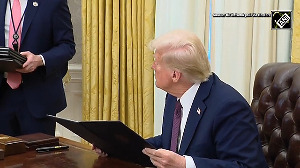Retired Brigadier Naeem Salik, who served in Pakistan's military for more than 30 years in positions that included director for arms control and disarmament affairs at the secretariat of Pakistan's National Command Authority, believes that 10 years after the May 1998 tests, both New Delhi and Islamabad are vulnerable enough to find themselves setting off a preemptive strike.
Salik, currently a visiting scholar at the Johns Hopkins University's School of Advanced International Studies, following guest scholar stints at the Brookings Institution, Stimson Center, and the Stanford University's Center for International Security and Cooperation, said the South Asian nuclear environment was still evolving and that "command, control, communication and intelligence structures are developing but are vulnerable to decapitating strikes."
He noted, "India has an advanced space programme and Pakistan is trying to catch up, but at the moment both sides lack real-time surveillance and early warning capabilities, which can enhance crisis instability."
"Both sides," he continued, "are pursuing assured second-strike capabilities but in the short-term, deterrence will remain unstable."
Salik said that there still remained "a general lack of awareness of the devastating effects of a nuclear conflict amongst the masses of both sides," and bemoaned that such ignorance could result in undesirable public pressure on decision-makers during crises.
He said the Pakistan military is fully integrated into the nuclear command and control and decision-making mechanisms but that things were different in India, where the armed forces "are still kept out of the loop. This could create problems when they are asked to take responsibility in a crisis."
Salik, who is currently working on a book project titled Genesis of South Asian Nuclear Deterrence, said India's vow not to use nuclear weapons against non-nuclear weapons other than those aligned to a nuclear power, did not make sense. "If you use that qualification, I think hardly any State is left which is not subject to Indian nuclear retaliation," he said.
He said the Comprehensive Test Ban Treaty is all but dead. Obviously taking a swing at Robert Einhorn, who had argued that the nuclear tests had put paid to any ratification of this treaty, he said, "It is very easy to blame India and Pakistan. Up till 1999, there was a lot of pressure on India and Pakistan to join the CTBT. But once the US Senate rejected CTBT's ratification, it gave India and Pakistan a very strong argument to stay out of it."
He said that while nuclear nonproliferation could be not compromised, India had kept its options open. Salik also acknowledged that India had the right as a sovereign State to conduct nuclear tests if it wanted to. But he argued that the US had either not realised or ignored the fact that other sovereign States in South Asia could follow suit.
"I am sure Pakistan will be looking for such an opportunity, and that would be disastrous. Let's hope it doesn't happen," he said.
He also took issue with the contention that the Indian and Pakistan tests were what had torpedoed the Fissile Material Cut-off Treaty too. Salik pointed out that India and Pakistan had expressed their desire to go along with the consensus in the Conference on Disarmament but had been put off by the US and China on issues such as the militarisation of space and missiles defenses. Now, while the US is insisting on a non-verifiable treaty, other countries, including India and Pakistan, insist on a verifiable treaty, he said.
Salik said that before an FCMT came into force, it was unlikely that either New Delhi or Islamabad would agree to a moratorium on fissile material production. The nonproliferation lobby has been urging the members of the nuclear club to impose one on India and Pakistan particularly India in exchange for assured nuclear fuel for its civilian reactors.
He also dismissed concerns over the safety and storage of Pakistan's nuclear weapons arsenal.
Fortunately, the fear that Islamist parties would prevail in the election and get their fingers on the nuclear button has been unfounded, thus eliminating one of the major causes of concern, he said.
Declining to go into details, Salik, who is familiar with the safeguards in place in Pakistan's National Command Authority, said, "A lot of measures have been put in place and the whole system of command and control has been institutionalised over the years. I don't think there will be any threat to the nuclear command even if the political situation in Pakistan remains volatile in the near future."
Also Read: Politics has defeated the purpose of Pokhran






 © 2025
© 2025